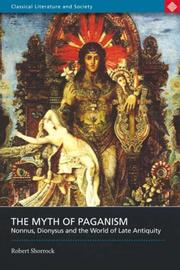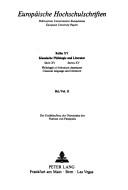| Listing 1 - 10 of 19 | << page >> |
Sort by
|
Periodical
Abstract | Keywords | Export | Availability | Bookmark
 Loading...
Loading...Choose an application
- Reference Manager
- EndNote
- RefWorks (Direct export to RefWorks)
Book
Year: 1962 Publisher: London : Heinemann,
Abstract | Keywords | Export | Availability | Bookmark
 Loading...
Loading...Choose an application
- Reference Manager
- EndNote
- RefWorks (Direct export to RefWorks)
Book
ISBN: 900431069X 9789004310698 9789004310117 9004310118 9789004310117 Year: 2016 Publisher: Leiden, [Netherlands] ; Boston, [Massachusetts] : Brill,
Abstract | Keywords | Export | Availability | Bookmark
 Loading...
Loading...Choose an application
- Reference Manager
- EndNote
- RefWorks (Direct export to RefWorks)
The Egyptian Nonnus of Panopolis (5th century AD), author of both the ‘pagan’ Dionysiaca , the longest known poem from Antiquity (21,286 lines in 48 books, the same number of books as the Iliad and Odyssey combined), and a ‘Christian’ hexameter Paraphrase of St John’s Gospel (3,660 lines in 21 books), is no doubt the most representative poet of Greek Late Antiquity. Brill’s Companion to Nonnus of Panopolis provides a collection of 32 essays by a large international group of scholars, experts in the field of archaic, Hellenistic, Imperial, and Christian poetry, as well as scholars of late antique Egypt, Greek mythology and religion, who explore the various aspects of Nonnus’ baroque poetry and its historical, religious and cultural background.
Nonnus, --- Nonno, --- Nonnos, --- Nonnus Panopolitanus --- Panopolis, Nonnus of --- Pseudo-Nonnos --- Criticism and interpretation.
Book
ISBN: 9788862740593 Year: 2008 Publisher: Alessandria : Edizioni dell'Orso,
Abstract | Keywords | Export | Availability | Bookmark
 Loading...
Loading...Choose an application
- Reference Manager
- EndNote
- RefWorks (Direct export to RefWorks)
Nonnos de Panopolis --- Critique et interprétation --- Nonnus, --- Criticism and interpretation --- Nonno, --- Nonnos, --- Nonnus Panopolitanus --- Panopolis, Nonnus of --- Pseudo-Nonnos --- Critique et interprétation.
Book
ISBN: 9789004355125 900435512X 9789004341197 9004341196 Year: 2017 Publisher: Leiden ;Boston Brill
Abstract | Keywords | Export | Availability | Bookmark
 Loading...
Loading...Choose an application
- Reference Manager
- EndNote
- RefWorks (Direct export to RefWorks)
Nonnus of Panopolis in Upper-Egypt is the author of the 48 books of the last large scale mythological epic in antiquity, the Dionysiaca. The same author also wrote an epic poem on the life and times of Jesus Christ according to St John’s Gospel. Nonnus has an outstanding position in ancient literature being at the same time a pagan and a Christian author, living in a time when Christianity was common in the Roman empire, while pagan culture and traditional world views were still maintained. The volume is designed to cover literary, cultural and religious aspects of Nonnus’ poetry as well as to highlight the social and educational background of both the Dionysiaca and the Paraphrasis of the Gospel of St. John.
Nonnus, --- Nonno, --- Nonnos, --- Nonnus Panopolitanus --- Panopolis, Nonnus of --- Pseudo-Nonnos --- Criticism and interpretation --- E-books --- Conferences - Meetings

ISBN: 9780715636688 0715636685 Year: 2010 Publisher: London: Duckworth,
Abstract | Keywords | Export | Availability | Bookmark
 Loading...
Loading...Choose an application
- Reference Manager
- EndNote
- RefWorks (Direct export to RefWorks)
With the adoption of Christianity as the official religion of the Roman world in the fourth century AD, the role of the poet underwent a radical transformation. In place of the traditional poet of the Muses there emerged a new figure, claiming inspiration and authority from Christ. The poet of Christ soon came to eclipse the poet of the Muses, and in doing so established a conceptual framework that still drives modern approaches to the period. Christian poetry is taken 'seriously' as making a relevant and valuable contribution to our understanding of the late antique world; by contrast 'pagan' or 'secular' poetry is largely ignored, as though it were devoid of meaning. The Myth of Paganism seeks to re-evaluate the role of 'pagan' poetry in late antiquity. Instead of maintaining a strict dichotomy between 'pagan' and 'Christian', it presents a broader definition of these poets as active participants and collaborators in the creation of late antique culture. Attention focuses on an exploration of the contemporary resonance of Nonnus' Dionysiaca - traditionally regarded as a 'pagan' epic in terms of its theme and content, yet in all probability the work of a 'Christian' poet responsible for a Homeric-style retelling of St Johns Gospel.
Paganism in literature. --- Nonnus, --- Paganisme dans la littérature --- Nonnos de Panopolis --- Dionysiaques
Book
ISBN: 2503508553 9782503508559 Year: 1999 Volume: 9 Publisher: Turnhout: Brepols,
Abstract | Keywords | Export | Availability | Bookmark
 Loading...
Loading...Choose an application
- Reference Manager
- EndNote
- RefWorks (Direct export to RefWorks)
Classical Greek language --- Pseudo-Nonnus --- Pseudo-Nonnos --- Language --- Christian literature, Early --- Greek language, Hellenistic (300 BC-600 AD) --- Greek authors --- Early Christian Literature --- Greek language, Hellenistic (300 B.C.-600 A.D.) --- Greek language (Koinē) --- Hellenistic Greek --- Koinē (Greek language) --- Early Christian literature --- Patristic literature --- Pseudo-Nonnos. --- Nonnus, --- Pseudo-Nonnianus --- Pʻsevdononos --- Psevdo-Nonn --- Language. --- Nonnus --- Christian literature, Early - Greek authors - Concordances --- Greek language, Hellenistic (300 BC-600 AD) - Glossaries, vocabularies, etc --- Pseudo-Nonnos - Commentarii in Gregorii Nazianzeni Orationes - Concordances --- Pseudo-Nonnos - Language --- Pseudo-Nonnos - Commentarii in Gregorii Nazianzeni Orationes
Book
ISBN: 3110419203 3110419246 3110412055 9783110419207 9783110419245 Year: 2016 Publisher: Berlin/Boston De Gruyter
Abstract | Keywords | Export | Availability | Bookmark
 Loading...
Loading...Choose an application
- Reference Manager
- EndNote
- RefWorks (Direct export to RefWorks)
Das vorliegende Buch bietet eine eingehende Analyse der Episode um den Satyrn und Dionysos-Liebling Ampelos, die Nonnos von Panopolis (5. Jh. n.Chr.) in den Büchern zehn, elf und zwölf der Dionysiaka, dem letzten griechischen Epos der Antike, aufspannt. Im Charakterprofil seiner Ampelos-Figur, in deren Todesschicksal und Verwandlung in den Weinstock, spiegelt der Autor sein poetisches Konzept, das zugleich mit der Rückbesinnung auf jahrhundertelang tradierte Kultur- und Erzählformen einer neuen, dionysischen Formensprache verpflichtet ist. Die sprachlichen, stilistischen und kompositionellen Eigenheiten, die kreative Auseinandersetzung mit Dichtern wie Homer oder den Hellenisten, die Übernahme von rhetorischen Techniken und überkommenen poetischen Motiven sowie das gelehrte Spiel mit traditionellen Genera arbeiten auf das narrative Ziel der Ampelos-Episode hin: die Ausstattung des Dionysos mit seinem wichtigsten Attribut, dem Wein. Ampelos ist somit nicht nur Voraussetzung für zahlreiche Narrative in den Büchern 13 bis 48 der Dionysiaka, sondern wird zur Schlüsselfigur im poetischen Dialog der Spätantike und zum Kumulationspunkt des hellenischen Synkretismus des östlichen Mittelmeerraums.

ISBN: 3261023953 Year: 1977 Volume: Bd. 11
Abstract | Keywords | Export | Availability | Bookmark
 Loading...
Loading...Choose an application
- Reference Manager
- EndNote
- RefWorks (Direct export to RefWorks)
Nonnus, --- Rhetoric, Ancient --- Dionysus (Greek deity) in literature --- Epic poetry, Greek --- -Greek epic poetry --- Epic poetry, Classical --- Greek poetry --- Classical languages --- Greek language --- Greek rhetoric --- Latin language --- Latin rhetoric --- History and criticism --- Rhetoric --- Nonnus of Panopolis --- -Technique --- -History and criticism --- Ancient rhetoric --- Nonno, --- Nonnos, --- Nonnus Panopolitanus --- Panopolis, Nonnus of --- Pseudo-Nonnos --- Technique. --- Rhetoric, Ancient.
Book
ISBN: 9070265397 Year: 1987 Publisher: Amsterdam Gieben
Abstract | Keywords | Export | Availability | Bookmark
 Loading...
Loading...Choose an application
- Reference Manager
- EndNote
- RefWorks (Direct export to RefWorks)
Epic poetry, Greek --- -Greek epic poetry --- Epic poetry, Classical --- Greek poetry --- History and criticism --- Oppian --- Nonnus of Panopolis --- Quintus Smyrnaeus --- History and criticism. --- -History and criticism --- Cointus Smyrnaeus --- Quintus van Smyrna --- Nonnus, --- Oppian, --- Quintus --- Calaber, Quintus, --- Kointos, --- Quinto, --- Quintus, --- Smyrnaeus, Quintus, --- Κόϊντος. --- Oppianos, --- Oppianus, --- Nonno, --- Nonnos, --- Nonnus Panopolitanus --- Panopolis, Nonnus of --- Pseudo-Nonnos
| Listing 1 - 10 of 19 | << page >> |
Sort by
|

 Search
Search Feedback
Feedback About UniCat
About UniCat  Help
Help News
News